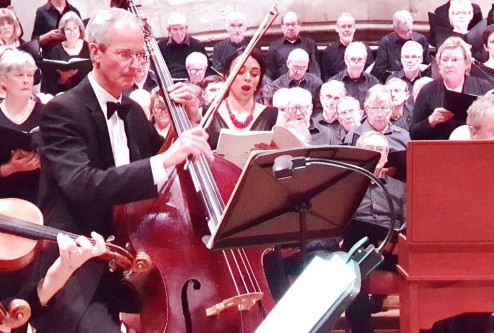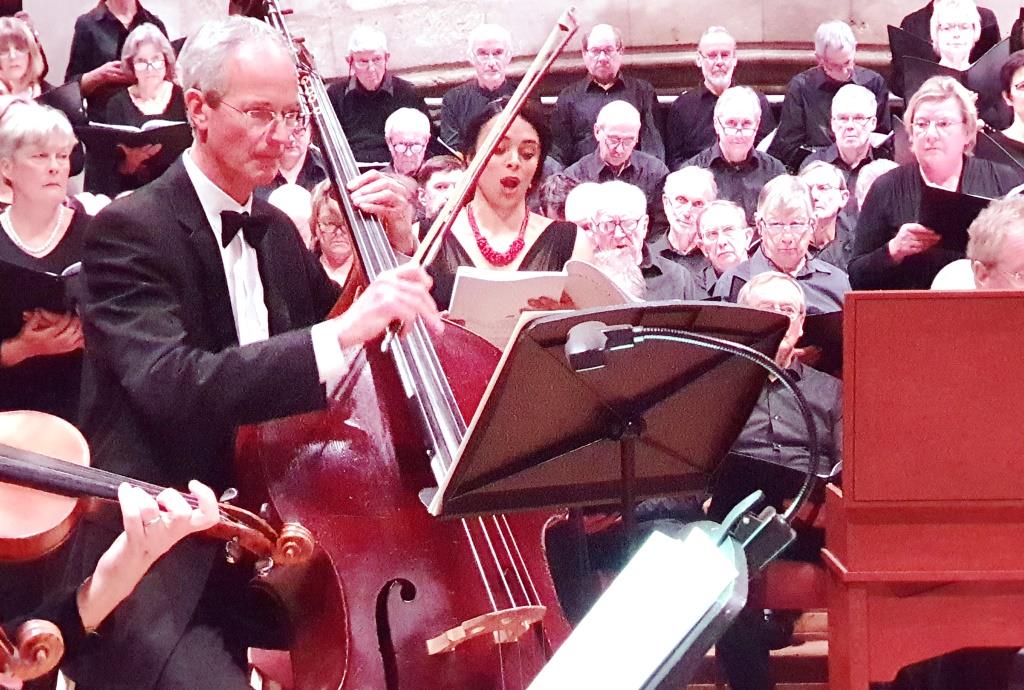 United Kingdom Ryba, Handel: Milly Forrest (soprano), Julieth Lozano (soprano), Robert Jenkins (tenor), Julian Chou-Lambert (baritone), Dartington Community Choir, Dartington Sinfonietta / Simon Capet (conductor). Great Hall, Dartington, 9.12.2018 (PRB)
United Kingdom Ryba, Handel: Milly Forrest (soprano), Julieth Lozano (soprano), Robert Jenkins (tenor), Julian Chou-Lambert (baritone), Dartington Community Choir, Dartington Sinfonietta / Simon Capet (conductor). Great Hall, Dartington, 9.12.2018 (PRB)

Jakub Jan Ryba – Czech Christmas Mass
Handel – Dixit Dominus
While most families across the nation will soon be tucking into their Christmas dinner of Roast Turkey and all the trimmings, others might prefer a less-traditional approach, and opt for a different choice of menu. And so it is, too, with Christmas music, where performances of Handel’s Messiah, for example, proliferate up and down the country during the festive season, from the smallest village church-choir to massed gatherings in some of the largest auditoriums around.
On paper, Dartington Community Choir (DCC) still seemed to be offering traditional fayre, but with conductor Simon Capet’s astute sense of programming, it did – and it did not. Yes, there was still an extended work by Handel on offer, though this was now compact enough to fill just the second half of the evening. There was also a well-known Christmas Mass, too. Paradoxically the Mass may be, in fact, better-known than the Handel with which it shares the programme – with one rather crucial proviso, as Capet pointed out in his introductory welcome. Jakub Ryba’s Czech Christmas Mass, written in 1796, is arguably as well-known in its homeland, as Handel’s Messiah is in the whole of the English-speaking world, but it is far-less-frequently heard in the UK. Capet explained in the programme notes that Ryba’s Mass is exceptionally simple, almost a naïve, childlike celebration of a story about sleepy peasants gathering somewhere in snow-covered Bohemia, to follow the star leading to the Baby Jesus. With its deep roots in folk music, it has the uncomplicated appeal of some of our own best-loved English carols. It is now seen as an essential part of Czech Christmases, intended to be sung in ordinary churches to ordinary people. As such, it could not have provided a greater contrast to the Handel work, his Dixit Dominus, one of the composer’s earliest choral works, written in Rome when he was just twenty-two. Here the music shows exceptional brilliance, and the dramatic contrast within and between movements vividly illustrates and reinforces the text – all in all a veritable tour de force for choir and soloists.
Ryba’s Mass was composed in the same year as Haydn’s Missa in tempore belli and his Trumpet Concerto. From the very opening, it leans heavily on the style of the Austrian master in particular, and it certainly conforms to Haydn’s ideas on religious music: no need to be serious and ponderous where praising God is involved. From the very first bars of Ryba’s work, we are immediately plunged into pastoral surroundings, and frequent references to the familiar chimes of cuckoo clocks. For all its simplicity, it does very much succeed in creating exactly the right atmosphere straightaway. It is scored for a small chamber ensemble of strings, one flute, clarinets and horns in pairs, trumpet, timpani, and accompanying Chamber Organ. There is a real lightness in the texture throughout, which allows every little solo woodwind phrase to sing through, along with the organ’s suitably delicate contribution. Here, Dartington Sinfonietta, under the assured and highly sensitive leadership of Mary Eade, provided the perfect backing, always responding immediately to Capet’s abundantly clear, yet efficient beat, and fully receptive to every nuance of dynamic shading and balance.
For a work like this to come off, it cries out for equally sympathetic vocal soloists who are prepared to get into the character of ordinary folk like shepherds. Here it was made significantly easier by the use of an effective English translation of the original Czech. All four young soloists – Milly Forrest and Julieth Lozano (sopranos), Robert Jenkins (tenor), and Julian Chou-Lambert (baritone) – successfully achieved this, finely matching vocal inflexion to textural content. The choir was, as ever, on top form. Even if possibly one or two of the more-seasoned choral aficionados were finding that there was not a great deal to challenge them here, they all pulled together magnificently, and produced a joyous, spontaneous and eminently enthusiastic sound the whole time, much to the sheer delight of the packed audience.
But for those singers who were still looking for a real challenge, Dixit Dominus more than compensated. Its very essence is just so different, and on so many levels. Ryba’s work is an uncomplicated sing, every movement is in a ‘happy’ major key, centring on a simple key relationship, and contrapuntal techniques are kept to a minimum. Dixit Dominus begins and ends in the minor key, with choruses that inhabit a completely different sound-world, and vocal virtuosity is as high on the agenda as melodic simplicity was in Ryba’s piece. Once again the DCC songsters proved themselves more than equal to the task, having clearly been well-drilled in rehearsal, so that they could exude confidence in the final performance, despite the work’s obvious bristling technical difficulties.
The soloists, too, moved up more than a gear. Their delivery in contrapuntal sections, and in frequent coloratura passages, was most commendable. While it might seem a tad unfair to single out one voice in particular, a special mention must go to soprano Milly Forrest, who not only despatched her own part with great aplomb, but also came to the assistance of fellow-soprano Julieth Lozano, who apparently had not been in the best of health during the day. Forrest took over one of Lozano’s allotted arias – not an easy ask late in the day, and when it required singing two arias back-to-back.
Equally, with the woodwind, brass and percussion having taken an early bath after the Ryba, the remaining small string section did an absolutely sterling job in the Handel, with two especially commendable contributions by cello continuo Vicky Evans and by Peter King on chamber organ.
With the glorious surroundings and fine natural acoustic of the 14th-century Great Hall on the Dartington Estate, this was another musical occasion to be treasured, and definitely one where the true spirit of Christmas was very much to the fore.
Philip R Buttall
